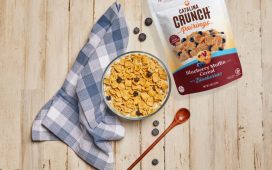MINNEAPOLIS — General Mills, Inc.’s $8 billion acquisition of Blue Buffalo Pet Products, Inc. during fiscal 2018 paid dividends for the company during fiscal 2019. Added distribution of Blue Buffalo products in the food, drug and mass retailer channels pushed Pet business unit sales up 11% during the year to $1.43 billion. The increase offset weaknesses in several other General Mills business units.
For the year ended May 26, General Mills earned $1,752.7 million, equal to $2.92 per share on the common stock. Fiscal 2019 net income fell 18% from the year prior when the company earned $2,131 million, equal to $3.69 per share.
General Mills’ sales rose 7% to $16,865.2 million during the year.
“Organic net sales were in line with year-ago levels with growth in our Asia and Latin America and Convenience Stores and Foodservice segments, offsetting declines in North America retail and Europe and Australia,” said Jeffrey L. Harmening, chairman and chief executive officer on June 26 during a conference call with financial analysts.
The company’s largest business unit, North America Retail, saw its sales fall 2% to $9.92 billion, according to the company. Organic net sales declined 1%.
“We competed more effectively in fiscal 2019 as measured by our market share performance,” Mr. Harmening said.
General Mills held or grew share in 7 of its top 10 U.S. categories, according to the company. The three categories that lagged included soup, fruit snacks and snack bars. In soup, the company was up against a difficult comparison to the business’ performance in fiscal 2018. Capacity constraints in fruit snacks limited that businesses performance during the year. Mr. Harmening said additional capacity will be coming online in fiscal 2020 that will unlock growth.

North America Retail operating profit totaled $2.28 billion during the year, a 3% increase compared to the year prior. Cost savings initiatives and lower selling, general and administrative expenses contributed, according to the company.
“In U.S. retail, the cereal category has sequentially improved for eight consecutive quarters,” Mr. Harmening said. “We grew our retail sales for the second year in a row, and we extended our leading market share position through good brand building and very good innovation.
“I’m also pleased with the improvements we made in our U.S. Yogurt business in fiscal ’19. We’ve improved our trends significantly over the past two years. We also grew share for the full year, a first since fiscal 2015. We improved our core yogurt business, which represents more than 50% of our retail sales and includes brands such as Go Gurt and original style Yoplait.”
General Mills’ Convenience Stores and Foodservice business unit had sales increase 2% to $1.97 billion during the year. Operating profit rose 7% to $420 million, primarily driven by cost savings and positive net price realization.
While the Pet business saw its sales increase during the year, segment operating profit fell 11% to $268 million. Items that affected performance included a one-time $53 million inventory adjustment and an intangible asset amortization of $13 million.
In fiscal 2020, management expects organic net sales to increase 1% to 2% and adjusted operating profit to increase 2% to 4% from the base of $2.86 billion reported in fiscal 2019.
“In fiscal 2020, our plans include continued strong innovation and investments in capabilities and brand building to accelerate our topline growth, efficiency initiatives to maintain our strong margins, and a disciplined focus on cash to further reduce our leverage,” Mr. Harmening said. “We remain confident that executing our consumer first strategy and our compete, accelerate, and reshape growth framework will drive sustainable, profitable growth and attractive long-term returns for our shareholders.”





